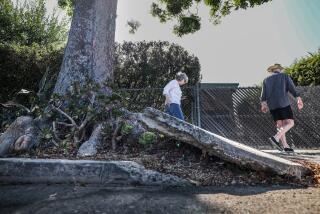Op-Ed: Bird scooters are ruining Venice
- Share via
I am certain that people who ride Bird scooters don’t read newspapers, so we may speak freely here. The reports you read are true: These electric scooters are everywhere — roads, sidewalks, street corners, parking lots, boardwalks, apartment complex hallways — beeping while stationary and whirring when rolling, ridden mostly by stoic mannequins in flip-flops.
Although I would like to avoid them, I have no choice but to consider them because I live in Venice, which is where the first Bird hatched and where the flock is thickest. Bird’s founder and CEO, Travis VanderZanden, says, “We won’t be happy till there are more Birds than cars,” so I guess I am supposed to get used to it.
Full disclosure: I am 38 years old and I either drive a car, ride a bike (man-powered), or I walk. I find electric bikes, scooters and skateboards pathetic. But I kept my scoffing to myself. Until now.
Because suddenly, almost daily, I have some near-collision with a Bird scooter rider — he who sees nothing but the phone in his hand, thinks of nothing but the next text, and hears nothing but whatever music he has chosen to pump through the white inserts protruding from his wasted ears. He who, despite all that, is still traveling up to 15 mph on the street or sidewalk.
Aside from road safety, which has been discussed thoroughly in this and other papers, Bird is also tearing away at the fabric of our Westside society.
Bird has hand-picked its customers: Digital natives only. Credit card, smartphone, data plan and driver’s license required.
In Venice and Santa Monica, where Bird is centralized, thousands of people live on the streets, which helps explain the scooter’s popularity. With a press of a throttle button, one can be whizzing along, leaving it all in a blur. Bird calls this solving the “first/last mile” problem. Problem? Is it a problem for a twentysomething to walk a single mile? To most residents, Venice itself is the solution: The weather is perfect, the ocean is a stone’s throw away and each block has something interesting to see. But to walk through Venice is to understand that human misery exists just outside the frame of your Instagram feed.
Around the corner from every Venice — excuse me, Silicon Beach — tech company is a collection of human feces, dirty needles and broken bicycle parts. A notorious homeless encampment hugs Google’s massive property line. Every week, the cops try to shoo its residents away, arrest them, shelter them. City crews come to scoop up the bottles of urine, the needles, the tarps, the tents, the bike parts, cardboard boxes and soiled garments. But the encampment always comes back.
And so Google simply turns away. Hulu, YouTube, Netflix, BuzzFeed — they all just turn their gaze back toward whatever screen they’re holding. At its 20,000-square-foot Venice Beach headquarters, Bird is building an indoor park.
Any concern about what effect these companies are having on the community outside their walls or suggestion that maybe their expansion is exacerbating the homeless problem, is shrugged off. Snapchat, which has drawn the most local ire, snatched up hundreds of thousands of square feet of prime Venice and Santa Monica real estate, displacing myriad local businesses, (semi) affordable housing and a youth homeless shelter. And they wonder why no one brought them a Bundt cake.
Building after building has been razed, replaced by some sleek eyesore to be circled ad infinitum by Ubers and Postmates drivers. These services do not empower the community — they fracture it. And now we have the Birds circling, too.
But Bird is different from those other tech companies, VanderZanden says. It is providing a service for the less fortunate. “Not everyone can afford their own electric scooter,” he said in an interview last month. We shouldn’t discriminate against people that are renting versus owning.”
In certain echo chambers, this might be a logical argument. But if homeless individuals want to hitch a ride on a Bird — perhaps to a job interview, or to visit a loved one, or simply to escape a dangerous situation in an encampment — they’re out of luck. Bird has hand-picked its customers: Digital natives only. Credit card, smartphone, data plan and driver’s license required.
I know what some of you are thinking: If Bird has ruined Venice Beach, why don’t I just leave? Pack up and move to Wisconsin? Because within a few years, they’ll be in Wisconsin, too. Whoever you are, wherever you are, they’re coming. And they won’t be happy until there are more Birds than cars.
Nate Jackson played in the NFL for the Denver Broncos for six years and has written two books,“Slow Getting Up” and “Fantasy Man.”
Follow the Opinion section on Twitter @latimesopinionand Facebook
More to Read
A cure for the common opinion
Get thought-provoking perspectives with our weekly newsletter.
You may occasionally receive promotional content from the Los Angeles Times.










